Home > Laser Eye Surgery > Presbyopia Correction
Presbyopia is the only sight condition which affects 100% of the population after a certain age (in general from 45 years old). Presbyopia surgery using a laser (femtosecond Lasik) or intraocular implants allows the symptoms to be corrected. Presbyopia can be associated with other visual deficiencies (myopia, astigmatism or hyperopia).
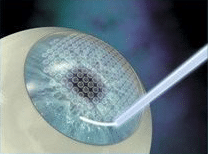
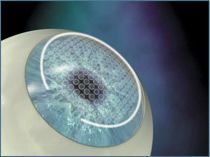

The mechanical or bistoury technique which is now old fashioned and has been abandoned in the most modern clinics as it is more risky than the 100% laser technique. We do not perform it nor recommend it.
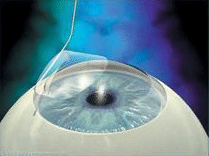
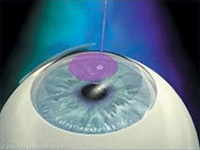
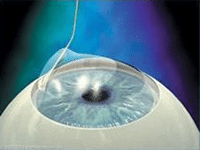





In a very small percentage of case (<5%) the cornea is too thin to do a corneal flap and the PRK method has to be used. It is the same as above except that the superficial layer of the cornea is dissolved. It hurts a little more but long-term results are as good. Using hight performance lasers like in Novacorpus clinics, increases your chance to get a femtosecond LASIK.
Presbyopia is caused by a loss of elasticity in the crystalline lens (the lens inside the eye which becomes rounded to create a magnifying effect allowing us to see close-up and reduces its roundness when we look into the distance. The crystalline lens allows us to see clearly close up and at a distance). When it loses its elasticity, the crystalline lens cannot contract and thus loses its magnifying glass effect to see close-up. As a consequence, the patient is obliged to move objects further away from their eyes to see them clearly.
The symptoms of presbyopia resemble those of hyperopia (like with hyperopia, the patient has trouble seeing close-up and finds it easier to see objects further away). This explains why hyperopic patients become presbytes earlier than other individuals.
Presbyopia is the trickiest sight condition to treat. Indeed, to date, there is no way of renewing the crystalline lens’ elasticity or of replacing its dynamic magnifying glass action (varying its curve in accordance with the distance at which a patient is looking). There are nevertheless 3 types of operation allowing for presbyopia to be corrected:
– This consists of adjusting the two eyes differently – one eye will see better far away and the other close-up. Note that this is already the case for most people (the two eyes never see in exactly the same way). The patient thus “balances” between near-sight monovision with one eye and far-sight monovision with the other, allowing them to see clearly both close-up and far-away. The brain compensates for this and the patient does not notice the difference.
– This method is often chosen for presbytes who are also myopes.
– It is necessary to check that the individual can effectively stand the difference between the two eyes (which is generally the case).
– A certain fatigue can set in when reading for a long time, which sometimes requires the patient to wear glasses.
– This consists of fitting a small implant inside the eye to allow near and far sight thanks to the implant’s “multifocal lens” characteristics.
– This method is often chosen for presbytes who are also hyperopic.
– This is a more invasive operation, even though it is up to date.
– It is more expensive as it is a longer operation and the material (implant) is more expensive. As with laser treatment, prices are lower abroad.
– It gives the best results among all available techniques for treating presbyopia (as for all of them, with some limitations)
– This method consists of sculpting the cornea and transforming it into a “progressive lens”. It is a delicate and highly personalised operation.
– Quite a long adaptation period is required (sometimes several weeks) and reoperations are more frequent than with the other types of laser sight correction.
– It causes a slight decrease in the sharpness of vision when looking into the distance.
– For these last two reasons, we only recommend this treatment for very specific cases.
– Save up to 75% compared to UK surgery costs with our guaranteed price.
– Access world-class quality accredited eye clinics and latest medical technology.
– Benefit from top specialist surgeons selected by Novacorpus, the only medical tourism company founded and directed by a medical doctor.
– Speak English with our concierge service and all our doctors (no translators).
– Be fully-insured to cover complications
– Travel with low-cost flights and sleep in affordable hotels
up to £3,600 for both eyes
Per eye:
from £1,230
Per eye:
from £700
(3 nights + airport transfers included)
Afraid of Turkey? Read the 5 myths about Turkey
No, as long as you follow certain rules. We are very strict in selecting our foreign partners as we want to be sure that we can place our complete trust in the doctor with whom we are going to work.
We also insist on the fact that you must follow to the letter all instructions which the doctor will give you on site (above all these will be recommendations linked to common sense, for example, rest after the operation). There are no more risks when being treated abroad than there are in your own country. As in all areas, it is impossible to eliminate risks 100%, however the risk of treatment abroad is no higher than in your own country.
You will indeed make large savings through going abroad to be treated. Find out more. Nevertheless, we also recommend that good quality treatment should be your priority and that you should carefully seek advice before leaving as regards the doctor and clinic.
We will do everything in our power to avoid this, through selecting up-to-date doctors and clinics. These doctors will give you all the necessary recommendations for good post-operative follow-up and will eventually recommend you a colleague near to where you live if necessary for a certain period. It is, however, impossible to eliminate all risks of complication in medicine. It should be noted that complications are not necessarily attributable to the doctor’s responsibility. They can sometimes occur due to a pre-existing condition, bad luck, or negligence by the patient. This is as likely to happen in your own country as it is elsewhere.
For this reason, we offer a guarantee which will cover risks of medical complications associated with voluntary operations both abroad and for 6 months after your return. This guarantee also covers the costs of returning abroad, including accommodation. Any emergency treatment linked to your initial treatment is also covered, both abroad and for 6 months after your return.
Moreover, we only work with practitioners and clinics who offer a guarantee. The duration of this guarantee varies (1 year to lifelong) and restrictions may be mentioned by the doctor or clinic (for example: exclusion of the consequences of an accident, a systemic illness, lack of hygiene, etc.) This guarantee nevertheless requires another trip abroad. In the event of an emergency, you may have to consult another practitioner closer to home. If you have not taken out insurance and NHS refuses to cover you, you may have to bear at least part of these costs
Of course, indeed we would recommend this. Going for treatment abroad is much more pleasant in good company. The slight increase in cost associated with being accompanied (train or plane fare and hotel) is largely compensated for by the benefits of having someone with you.
In order to determine if you can have the operation, you will need to have (painless) pre-operation examinations carried out. These examinations are carried out in Grenoble, Amsterdam or Istanbul. There is no waiting list, you can simply tell us which date would suit you (our clinics are very flexible). Around 90% of patients can have the operation.
It is important to note that you can go to an eye clinic in the UK to determine if you can be operated but the examinations should also be carried out in the clinic where you will have the operation, as the data collected is used to programme the laser.
Moreover, these clinics currently possess the best performing equipment (operation using the LASIK technique with INTRALASE brand femtosecond laser, which is famous as it is accredited by NASA to operate astronauts) allowing it to operate on patients who have been declared non-operable by Lasik in other clinics (and who have therefore been offered intra-ocular implants, a much more invasive operation, or PRK, which is more painful).
For more answers and to see the risks and contra-indications associated with Lasik please see our full Laser Vision Correction FAQs page
| Cookie | Duration | Description |
|---|---|---|
| cookielawinfo-checkbox-analytics | 11 months | This cookie is set by GDPR Cookie Consent plugin. The cookie is used to store the user consent for the cookies in the category "Analytics". |
| cookielawinfo-checkbox-functional | 11 months | The cookie is set by GDPR cookie consent to record the user consent for the cookies in the category "Functional". |
| cookielawinfo-checkbox-necessary | 11 months | This cookie is set by GDPR Cookie Consent plugin. The cookies is used to store the user consent for the cookies in the category "Necessary". |
| cookielawinfo-checkbox-others | 11 months | This cookie is set by GDPR Cookie Consent plugin. The cookie is used to store the user consent for the cookies in the category "Other. |
| cookielawinfo-checkbox-performance | 11 months | This cookie is set by GDPR Cookie Consent plugin. The cookie is used to store the user consent for the cookies in the category "Performance". |
| viewed_cookie_policy | 11 months | The cookie is set by the GDPR Cookie Consent plugin and is used to store whether or not user has consented to the use of cookies. It does not store any personal data. |